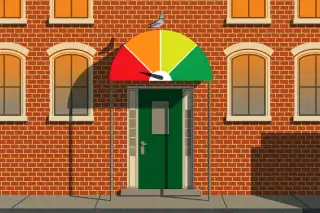How to Rent an Apartment With Bad Credit

You’re probably familiar with the pains of filling out apartment rental applications.
Wrangling with security deposits, cosigners and pay stubs can get taxing fast. And if you have a low credit score, or even a mediocre one, the endless parade of hoops you’re asked to jump through only multiplies.
Bad credit can be a huge headache when it comes to finding a new apartment, but all hope isn’t lost. Here is a roundup of tips for improving your odds of getting approved by a potential landlord if your credit history is less-than-stellar.
Prove you can afford to pay the monthly rent
Whether the property you’re interested in is owned by an individual landlord or a retail management company, you’ll want to show them up front that you make enough money to cover each month’s rent payment.
The easiest way to do this is by providing current bank account statements that include a dated register of any money you have coming in regularly — whether that’s from a salaried job, gig work or an allowance from a family member.
Be sure to provide the entire statement—your potential landlord will want to see how much money you’re spending each month, too—as well as a snapshot of how much money is currently sitting in your savings account. Most banking apps make it fairly easy to select and share all of this info.
Offer to pay a higher security deposit
Chalking up the money to pay for a security deposit can be a real pain, but if you want to prove that you have the cash on hand to snag the apartment of your dreams, consider offering even more than is required.
You don’t break the bank — if the normal security deposit is one month’s rent, offer up two months instead. This will put your landlord at ease if they’re concerned you’ll default, or another worst-case scenario.
Offer to pay some of the rent upfront
Like the higher security deposit option, offering to make a few month’s worth of rental payments before you move in will increase the likelihood that a prospective landlord or property manager will take a chance on you.
When offering up the extra cash, it might be worth explaining why your credit report has taken a hit. If you’re dealing with a bankruptcy, credit card debt or medical bills, be upfront about that.
The extra money will help your landlord see that you are on the right track and serious about this investment.
You can also suggest signing up for automatic payments, which will come straight out of the bank account you’ve already provided a snapshot of, for the rest of the lease term.
Get a cosigner or guarantor
Guarantors aren’t an option everywhere, but in large cities like New York and San Francisco where rent is astronomically high, this is a popular option.
If you can get a parent or someone else who’s close to you with good income and credit who is willing to vouch for you in a guarantor or cosigner relationship, the odds of getting approved for a new apartment are exponentially higher. It can be a tricky line to toe: Most buildings require a guarantor to make 80 times the price of rent, and all require them to make up any rental payments the leaseholder falls behind on.
Likewise, some properties require guarantors and cosigners to live in the same state as you do, since it’s harder to run down charges for outstanding payments across state lines.
Regardless, both of these options show potential landlords that they’ll be able to collect on your monthly rent if you default.
Ask for reference letters
You’ll probably be asked to provide contact info for your past landlords on the rental application, but it pays to go the extra mile and have at least one of them write you a letter of recommendation.
Ask them to mention that you always paid rent on time, were a considerate (and clean!) tenant, and that they didn’t have to threaten you with eviction. Also, have them note that you left your old apartment in great condition, that you reported any issues that needed attention in a prompt manner, and that your rental history is sparkling clean.
Go through your credit report with a fine-tooth comb
Scan your most recent credit report carefully to be sure that no mistakes or errant charges are responsible for your bad credit score. You should also make sure all of your past addresses are correct and check for other signs of identity fraud. Reporting this to the credit card company could result in the credit bureau removing the citation from your report, which would immediately help your credit score — and bump up your chances of getting approved.
You can also try Money’s other recommended quick tricks to help get on the path to good credit ASAP. The most tried and true advice? Pay down all your credit cards until your credit utilization ratio is less than 30% or lower.
Look for rentals that don’t do credit checks
While they’re not as common, you can occasionally find a private landlord who is willing to let you bypass a credit check entirely.
Search through Craigslist, Facebook Marketplace and local message boards to see what’s out there. You might get lucky and find someone who’s looking to make a little cash while they wait for their home to sell, or pad their retirement savings with the help of an inherited rental property.
More from Money:
How to Read Your Credit Report